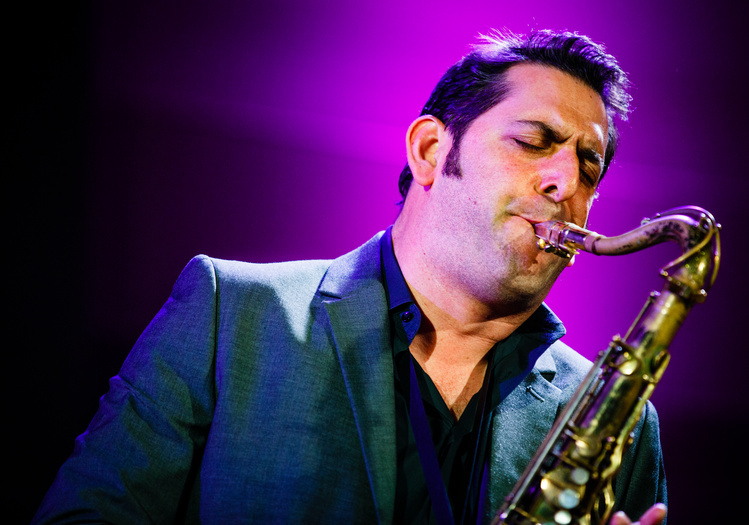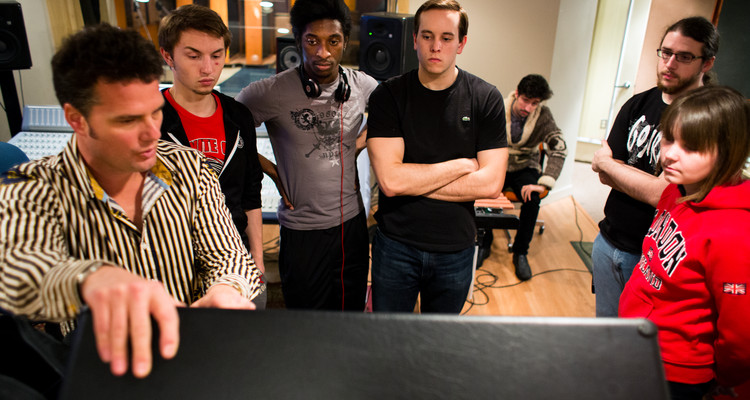A smile sneaks onto junior Nick Meyerson’s face as he leans forward, neglecting the support of his chair’s backrest during a conversation in the lobby of St. Thomas’ O’Shaughnessy Educational Center. A first-generation college student from Delano, Minnesota, who goes by the artist name Nick Jordan, he describes the creative evolution that has played into the near-completion of his latest musical project.
“I feel like I want to just get rid of everything I’ve ever done before,” he says. “This is going to be so much more.”
"More" is an apt word for music, an intrinsically human creation that can – and does – connect people throughout time and space.
Across Summit and Cretin avenues days after Meyerson's optimistic dialogue, music professor Chris Kachian, within his office in Loras Hall, laments a more negative mentality that has pervaded his occupational field for millennia.
“This concept of starving artists has always bummed me out,” he says. “We need to step up.”
More than 1,500 miles away at her home office in Los Angeles, 2014 St. Thomas graduate Rachel Siteman revels in the knowledge she is starting her career on a promising path: a marketing position at Universal Music Group, the largest music corporation in the world.
“I love this job,” she says. “The creativity is what I enjoy the most. I’ve always been a creative person. I played an instrument, I can draw … and marketing is the culmination of all my creative interests.”
On the first floor of McNeely Hall back at St. Thomas, Georgia Fisher approaches the marriage of music and business with a daughter and son-in-law who both are working artists.
“The thought was evolving from music as an art form, performance as an art form, and not a thought as to how you make a living with this if you don’t go on to become a performer or teach,” says Fisher, the assistant dean of undergraduate students at the business school. “How do you make a living out of music?”
Across Summit Avenue at the Anderson Student Center, 1997 grad Aimee Petra talks about the decade she toured the world as an opera singer, then about the consulting firm in the mental health industry she now runs.
“The reality is a musician can look at a blank piece of paper and create music where there wasn’t before,” she says. “That’s a different way of thinking than most other competitors in the business world.”
Back in Loras Hall, music business director Steve Cole notes the reality his students face as they prepare to enter a constantly changing world of music.
“There’s full acknowledgement that this ain’t easy,” he says. “It takes a very strong desire to succeed in this industry. And a passion for whatever they want to do. It sounds really cliché, but you truly have to have a passion for this.”
The thread of music connects these people. More than that is the connection they share through St. Thomas’ music business education, which has a long tradition dating back to the 1970s.
But today’s program is not leaning on that tradition; it is forging a new one. A dedicated effort, born of a commitment to creating cutting-edge professionals who not only thrive in the industry they enter but can shape it moving forward, has taken place in recent years. This effort has resulted in the reimagining and revising of how music business students are prepared for careers.
“We want students to feel like they’re architects,” Cole says. “We want them to realize there’s an opportunity to take part in how this industry evolves.”
A new aim
Like many ideas before it, the origins of the music business program at St. Thomas as it stands today came over a cup of coffee. Several cups, actually. A little less than a decade ago Kachian dropped his daughter off at school each day at 8 a.m. and didn’t start teaching until 10. In that downtime he thought through how St. Thomas music students were being educated. At that point there was a music business degree, but it was used sparingly and didn’t emphasize what Kachian believed it should.
“I kind of had to decide how I wanted our music business to be different than all the others,” he says. “(I thought,) ‘The way we’ll produce people … is to make sure we have people with credibility.’ The credibility artists have for one another is, ‘Can you play? Can you produce?’ So all our music business majors will have some business sense … and make sure they’re still prolific in all kinds of music.”
So, in 2006 Kachian and several colleagues set out to redesign the program, reaching out to Fisher and the business school for help. Up until then the music business degree had been the full requirements of a music performance degree, plus microeconomics, entrepreneurship for non-majors and four other business courses of the students’ choosing. Kachian and his colleagues wanted to strengthen the connection between music and business courses, further emphasizing the dynamic skills students would need in the wide-ranging, ever-changing music industry.
“Those students who are really focused on the craft, making music, they take the business courses because it’s going to help them do well with what they want to do,” Fisher says. “Still, their primary focus is always going to be on the music.”
The redesign appealed to students and – as things continued evolving in the coming years – began to see a growth in interest. As numbers increased Kachian sought to bring someone else in to head up the program and landed on Cole, a distinguished jazz musician with experience teaching music business at Columbia College Chicago and McNally Smith College of Music.
“Steve’s the best thing I ever lucked into,” Kachian says. “He’s taking this whole thing to the next level.”
Since taking over three years ago Cole has emphasized his students’ roles in developing their own directions and ways of thinking. That started right from square one, Siteman says, when he asked for student opinions and desires in how things should go.

“This group of kids got together and the Music Department let us sit with Steve … and we sat in that room for probably two hours giving a back and forth for what would happen with Steve and with the department,” she says. “We wanted to keep this dream alive for our students to be professionals in the music industry. People graduating before me were going out … and dropping out of the music industry. Steve said, ‘We have to do this to make kids understand they can be a part of the music industry, here and now.’”
Evolving world = evolving education
Remember, if you can, the emergence of Napster in 1999. The hand-wringing that started then has never really ceased when it comes to the recording industry, a 15-year search of how to repair what was once a seemingly infallible financial juggernaut. Such struggles are often the first thing that jumps to people’s minds when considering the music industry, an omnipresent warning sign to students and their parents. It is also a major misconception.
“People often define the music industry as the recorded music industry. But that’s really not it. That’s only a part of it. There are many other aspects of the music industry that are strong, growing and have opportunity,” Cole says. “It’s not as dire as people think it is. Yes, the recording industry is facing a challenge but there’s a broader scope to the music industry that encompasses a lot of things.”
Think instead of music’s place in our society, not simply what’s on your radio or iPhone or Spotify.
“Music’s everywhere. We’re drowning in it,” Kachian says. “And every time you hear music somewhere, that’s a contract.”
That monetization of human talent is the key to all things music business, Kachian adds, and lies at the heart of St. Thomas’ program: create professionals who are musically trained – their true credibility in the industry – and have the ability to tap into a limitless pool via their business education.
“What we focus on here is not what the past was or is and trying to recreate it or defend it, but to understand what is happening in the industry, where it’s going, developing the curiosity and innovation in our students to look at what opportunities this technology has created, and be able to capitalize on it,” Cole says. “To see the evolution of this industry as presenting opportunities, as opposed to simply challenging the status quo. That’s really the focus of our program and the future of music.”
Keeping pace with – and trying to get ahead of – an industry that’s constantly in shift requires a higher level of adaption than many educational fields, meaning revisions and on-the-fly shifts within classes all the time.
“I can’t teach the same lecture from semester to semester. I used to teach economics. I could teach that course over and over and intersperse some new contextual things … but I can’t teach introduction to music industry in 2014 like I did in 2013,” Cole says. “Look at all that has happened in one year. Our courses are always … evolving, and that’s what is exciting about our program.”
Such constant change brings inherent challenges to a student, made all the more difficult by the program’s emphasis on innovation and coming up with new ideas. Meyerson describes a recent assignment that required him to turn in three music demos within a week, a challenging prospect in and of itself.
“I grinded away on that and presented it and was very proud of it, and immediately we’re on to the next thing,” he says. “It’s encouraging. It’s that idea of, ‘What are you going to do next?’”
Such mentality is seemingly necessary to separate yourself in a world that – thanks to the continued democratization of music creation because of accessible technology – requires more passion and skill than ever.
“Instead of looking at (a changing industry) as a discouragement you can see it as a challenge to rise up to,” Meyerson says. “With the digital age the pool has gotten much bigger. We’re not controlled by what radio and what big records want to play. People have more of a voice in what we want, so how do you make your mark in that?”
‘A lethal combination – in a good way’
In the eyes of Cole, part of the appeal to the kind of education St. Thomas music business majors receive is that their skills are not isolated to the music industry. Nothing about being musically trained constrains a students’ career choices; in fact, it makes them all the more versatile away from music, Cole says.
“We’re training great professionals, period. It’s the creativity, the ability to communicate on such a granular levels like musicians have. The courage they have in standing up and performing in front of strangers, or, even more scary, friends. The problem-solving they have to do as musicians dealing with so many possibilities and finding their unique vision of how to combine those things, that’s creative sensibility. That’s innovative training. Put that together with management, you’re making a creative manager. A creative problem-solver,” he says. “I think these types of programs with an arts component are going to be what’s more and more desired by business in the future. A natural byproduct of what we do … is we’re creating well-rounded, creative, innovative professionals. They happen to also have a specific knowledge of a field but whose skills are transferable among any field.”
Petra lives that out in her daily life after going from world-class opera performer to the CEO of her own company.
“Our entire company is infused with a mission, creativity and a service-based mentality that I don’t think we would have if I was just a straight business person,” she says. “Our ability to think outside the box, to take a situation that on paper looks cut and dried and be creative with it … it’s literally the neurons that get trained when you’re studying music. I know I bring a perspective, and our company brings a perspective, that nobody else in the market has. One thing informs the other with music and business.”
Such a marriage is what Cole calls “a lethal combination – in a good way.”
“It was the secret of the room: We’re all learning how to creatively problem-solve,” Siteman says. “It came naturally from all the material, all the courses. I can look back and say they taught me a way to problem-solve that isn’t routine, but will help me succeed in one way or another the rest of my life.”
Problem-solving, creativity, critical thinking: all pursuits familiar to many across the liberal arts landscape of St. Thomas. It should come as no surprise then, that two areas of study – so different on the surface – have found a way to complement each other to form such a dynamic education.
“We’re so fortunate in that we have other schools we can work with in this program who are excited to collaborate with us and who love our students,” Cole says. “It’s wonderful to have such collaboration between our two programs to create this.”
The curriculum will continue to evolve, students and professors working together to determine how they might shape their world moving forward. Difficult and demanding as it might be, students have continued finding their way to the program: More music business majors graduated in the last three years than in the previous 15 combined.
Meyerson’s optimism for his own work, then, seems a fitting viewpoint on what lies ahead for music business at St. Thomas as well: “This is going to be so much more.”











